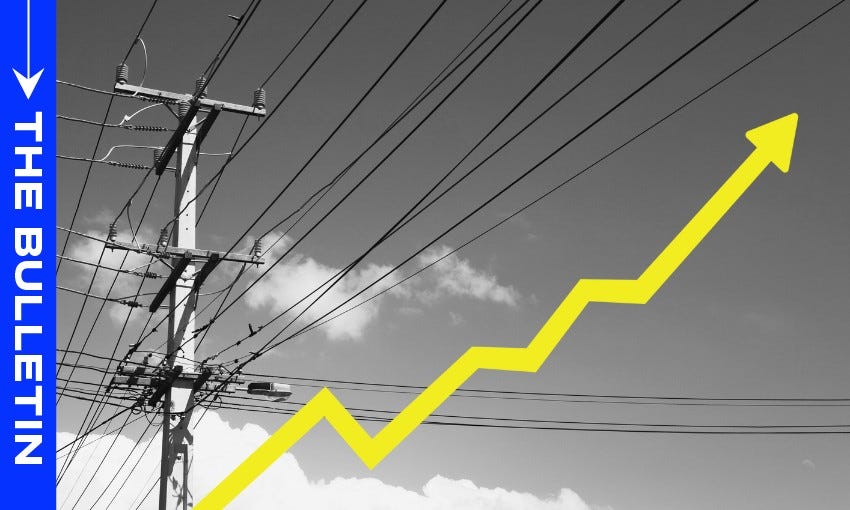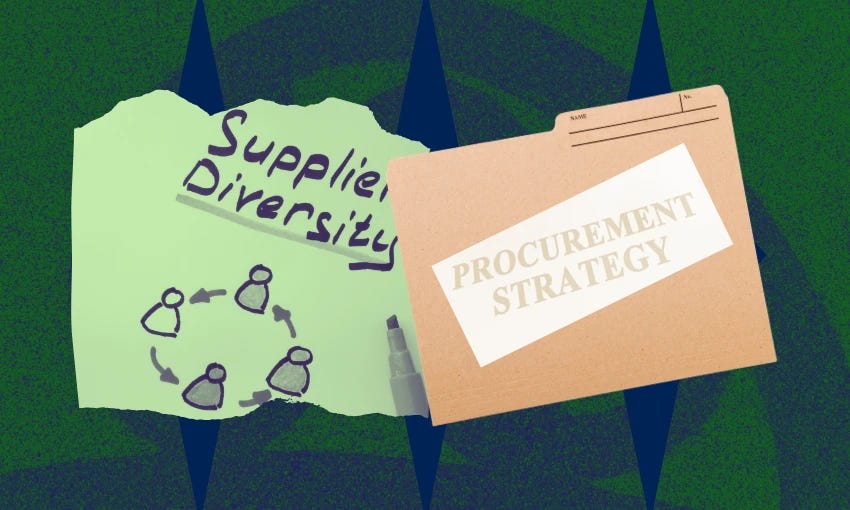The human face of the electricity crisis
The closure of two mills near Ohakune will mean the loss of 230 jobs.
Mōrena, and welcome to The Bulletin for Wednesday, September 11.
In today’s edition: The cost of holding a Māori ward referendum has been revealed, why it costs money to send money overseas, and are New Zealanders “sick and tired” of spending on cycleways? But first, it’s been confirmed a major employer in the central North Island will close.
‘This is all we know’
Winstone Pulp International, the largest employer in the Ruapehu District, has confirmed it will close its two mills indefinitely, leading to the loss of over 230 jobs. As Glenn McConnell reported last night for ThreeNews, it’s a serious blow for the region and a decision staff now out of work had hoped desperately could be avoided, launching a petition to try and save the mill. Winstone boss Mike Ryan blamed high energy costs for the decision and warned that other businesses of a similar nature could follow suit. But that’s little comfort for the hundreds now looking for new jobs, many of whom have known nothing else. "I've been here almost 20 years. It's become a second home," one worker told 1News. "Now what do we do? This is all we know."
Mill closure just one part of the puzzle
The writing has been on the wall for several weeks. The proposed closure was first put forward about a month ago. Then, in late August, a packed public meeting in Raetihi saw emotions run high. RNZ’s Alexa Cook was there, reporting that “one by one workers, their whānau, and other locals told the crowd, including the mill bosses and the National MP Suze Redmayne, that the closure is turning their lives upside down”. The Whanganui Chronicle reported that while the mill had pulled out “all the stops” to try and halt the closure, it was facing rising costs that were unsustainable.
Against the backdrop of all of this, a broader and ongoing electricity crisis is being dealt with. As we talked about a few weeks ago, the government has announced steps to try and address this, including a full review of the electricity market. But, despite calls for “instant results” from regional development minister Shane Jones, many of the government’s proposals are longer term ambitions that may do little to address the current situation. The mill closure is one part of that larger puzzle, but it has provided a human face to the crisis. It might not be the only casualty either, with RNZ’s Robin Martin reporting on another possible factory closure in Auckland’s Penrose.
Who is to blame?
The Winstone Pulp lies within the Rangitīkei electorate. As the Herald’s Thomas Coughlan reported, the local MP, National’s Suze Redmayne, is “gutted” by the pulp’s closure and said there would be a trickle down effect. “We’ve got people with partners that work in the health service – at the moment, our health service is struggling to get staff, so it makes a massive difference,” she said. While Redmayne wasn’t prepared to “blame” anyone for the situation, others in the government were quick to react.
On social media, Act’s Simon Court said it was the result of “economic vandalism” by Labour, adding rather brazenly that the former government had a “kamikaze approach” to climate change that had “crashed the reliability of our energy sector”. Despite having hard words in the past for the Electricity Authority, we’re yet to hear directly from Shane Jones. He’s due to speak to RNZ’s Morning Report shortly, if you’re interested.
What can be done
Labour’s manufacturing spokesperson Helen White told the Herald there were options to keep the mills open, blaming electricity gentailers for not investing sufficiently in new generation assets. The government, she said, should be intervening. That’s largely the same argument that’s been pushed previously by Shane Jones, and even the minister responsible for the electricity sector, Simeon Brown, but intervention hasn’t eventuated.
Smaller players in the market are arguing for change, too. As reported by BusinessDesk’s Ian Llewellyn, independent retailer Octopus Energy said the government’s moves, including importing liquid gas, won’t help address the underlying issues. “The Electricity Authority has been warned for years by industry and exporters that market arrangements have made electricity uncompetitive and prices too high for our productive sector,” said the company’s chief operating officer Margaret Cooney. In comments to Newsroom, Electric Kiwi’s Huia Burt similarly argued that “full structural separation [of generation and retail] is the gold standard”, though acknowledged a complete break up was unlikely. Everyone seems to know what the issue is – will anyone do anything about it?
Watch: A new episode of Takeout Kids
Episode four of Takeout Kids introduces Phitcha, who tells customers at her family’s Thai bistro she’ll check an order with “the chef”: AKA her dad. A pepeha-crafting lesson at school leads Phitcha to wonder about her family background, before a video call with her grandparents reminds her it's been five years since she left Thailand. Shrimp noodles dropped off by her mum at school provide a great bonding session for Phitcha and her friends, but it’s the ice cream she shares with her dad that breaks the most emotional ground.
Made with the support of NZ On Air.
The cost of holding a Māori ward referendum
As councils up and down the country were warned by the prime minister to tighten their belts and stop spending on “nice-to-haves”, the cost of holding public polls on Māori wards has some regions concerned. A law change means that any council that approved a Māori ward without a public referendum will now be required to hold one at the next local election, or else reverse the decision. As Azaria Howell reports on the front page of the Herald (paywalled), those polls won’t come cheap. Greater Wellington Council estimates it will cost $350,000 to hold the referendum, with the council’s chairman calling it “another example of expenditure that the government is forcing on local government”.
Should Auckland Council choose to hold a poll (something it is not yet required to do, having not implemented a Māori constituency), it could cost as much as $3.5m if the poll took place outside a local election period. For a smaller council, like Northland, it would cost about $14,000. Far North mayor Moko Tepania called the law “racist” and said the government had trust issues. “They keep telling us that we need to listen to our people. We are.”
More reading:
The Māori wards bill, explained (The Spinoff)
Kaipara Council’s decision to abolish its Māori ward will be challenged in the High Court (RNZ)
Sending money overseas can be expensive. Who does it hurt the most?
A really interesting feature on The Spinoff this morning from Shanti Mathias, looking at an issue many of us may never have considered: why it costs money to send money overseas. In 2022, explains Mathias, New Zealand paid more than $1.44bn to other countries via remittances – money sent to friends and family, usually living in lower-income countries. Just 0.2% of our own GDP was remittances in 2023, but in contrast, 45% of Tonga’s GDP, 28% of Samoa’s GDP, 9% of Fiji’s GDP and 15% of Vanuatu’s GDP was made up of remittances.
Mathias writes:
This makes the Pacific Island countries, with high numbers of people living overseas, among the most reliant on money being sent from other places. With hundreds of thousands of Pacific New Zealanders, lots of that money comes from Aotearoa.
Party like a 10 year old
You have until Sunday to go in the draw to win a mega hamper of goods ranked by The Spinoff. All you have to do is have your say on Hera Lindsay Bird’s ranking of our rankings. If you’re a member, you can get an extra entry by logging in and collecting the treasure hidden in stories posted this week. Find out more here.
Not a member? Now is a great time to show your support. We cannot overstate how vital support from our readers is, so thanks for being part of our story. Ten years, 29,000 articles published, all free to read, we wouldn’t have made it to this mighty milestone without you.
Click and Collect
Māori and Pacific young people in Hawke’s Bay are no longer eligible for free GP and nurse visits based on ethnicity, after the health minister intervened.
Are New Zealanders “sick and tired” of spending on cycleways? Not according to one survey, explains The Conversation. Meanwhile, The Spinoff’s Joel MacManus seeks out the mystery cycleway killing hospo businesses.
The government has sought feedback on 120km/h speed limits for new highways.
We talked last week about the tourism levy being hiked. The Herald reports that the decision to increase it to $100 went against official advice.
Why this Twitter account is a matter of “national security”.
For BusinessDesk subscribers, details of Kmart’s Westgate super store have been revealed as the retail outlet continues to expand. (paywalled)
Yesterday was The Spinoff’s 10th birthday – and also the 10th anniversary of that time U2 foisted a new album onto every iPhone owner without asking.
Sticking with music: I have been following the debate over whether Taylor Swift should or should not get embroiled in the US presidential election. What do you think?
Australia plans to ban children from social media. How and why?
Liam Rātana explains what supplier diversity is and why you should care. Gabi Lardies reviews Fur Patrol in 2024. Alex Casey reveals what The Spinoff looked like the day it launched. For the Cost of Being, a self-employed homeschooling mum describes how she splurges on skis and tramping gear - but nothing else.
That’s it for this morning, thanks for reading. I’ll catch you back tomorrow.
Want to get in touch? Join the conversation in the Substack comments section or via email at thebulletin@thespinoff.co.nz if you have any feedback on today’s top stories (or anything else in the news).
If you liked what you read today, share The Bulletin with friends, family and colleagues.
















So gutted for the communities where the mills are closing after months of uncertainty, and as mentioned other family members work out in the community so it's not just lost of wages if the family moves away. The electricity market is ONE MAJOR THING that most parties have some agreement on, either when in govt or opposition, so here's a chance for a non-partisan approach to dealing to the agreed issues with the "gentailers" that could take the heat off any one party by being done with consensus. (sorry for the pigs flying past ... 🫢can't seem to control them over the last few months 🐷🐖🐽🤷🏾♀️)